He was the man who discovered the Beatles, the man who inspired Herb Alpert, the man whose Strangers In The Night brought Frank Sinatra a comeback: Bert Kaempfert – the man whose world-famous melodies continue to give immense pleasure to millions of people in every corner of the world. In spite of his enormous, international success, Bert Kaempfert – or "Fips" as he was lovingly called by his friends – always stood modestly in the background.
Hamburg born and bred, he had no time for the extravaganza usually associated with people in the music business and star allures were foreign to him. Those who knew him well appreciated his dry humor. His compositions brought success to numerous world-famous stars such as Ella Fitzgerald, Peggy Lee, Sarah Vaughan, Brenda Lee, Shirley Bassey, Vikki Carr, Anita Kerr, Nancy Wilson, Caterina Valente, Engelbert, Dean Martin, Andy Williams, Johnny Mathis, Steve Lawrence, Al Martino, Frank Sinatra, Nat "King" Cole, Jack Jones, Sammy Davis Jr., Bobby Hackett, Duke Ellington, Count Basie, Stan Kenton, Al Hirt and Pete Fountain.
Early Years
Bert Kaempfert was born on October 16, 1923 in Barmbek, a working-class area of the city of Hamburg. At the age of six, little "Fips" was hit by a taxi and although times were hard and money scarce, his mother decided to buy him a piano with the DM 500 insurance settlement.
Later he attended a school of music named the "Hamburger Stadtpfeife" where he also learned to play the clarinet, saxophone and accordion.
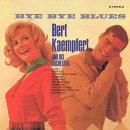 At the age of 16 Bert was engaged by the renowned Hans Busch Orchestra. Although he was drafted in World War II, he was able to continue making music with the German Naval Music Corps. While a prisoner of war in Denmark he founded the "Pik-Ass" (Ace of Spades) big band. After his release he went on tour with the band, playing at American officers’ messes in northern Germany.
At the age of 16 Bert was engaged by the renowned Hans Busch Orchestra. Although he was drafted in World War II, he was able to continue making music with the German Naval Music Corps. While a prisoner of war in Denmark he founded the "Pik-Ass" (Ace of Spades) big band. After his release he went on tour with the band, playing at American officers’ messes in northern Germany.
Post World War II Days
While in Bremerhaven, Bert Kaempfert got to know a pretty young girl, Hanne. It was love at first sight. The couple married in 1946. Their daughter Marion had hardly seen the light of day when they returned to Hamburg. Back in Hamburg he played for the BFN (British Forces Network). His first compositions were published under the pseudonym Mark Bones.
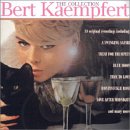 By the time his second daughter Doris was born in 1951 Bert Kaempfert was known to everybody in Hamburg who had anything to do with music. He composed and made arrangements, and found himself increasingly in demand.
By the time his second daughter Doris was born in 1951 Bert Kaempfert was known to everybody in Hamburg who had anything to do with music. He composed and made arrangements, and found himself increasingly in demand.
Somewhat later he worked for the record company POLYDOR. Such compositions as Catalania, Ducky, Las Vegas and Explorer brought initial success to his then small orchestra. He produced the smash hit Die Gitarre und das Meer for Freddy Quinn whose career had just begun in St. Pauli's "Washington Bar".
This was followed a short while later by Morgen which brought Ivo Robic his first golden record. When Elvis Presley came to Germany, songs were sought for his new film. Bert Kaempfert's arranged Muss i denn zum Städtele hinaus and as Wooden Heart the song was a hit all over the world for the "King". At the end of the Fifties, Midnight Blues was on everybody's turntable and was played especially often by the Armed Forces Radio in Europe.
Success In America
Shortly afterwards, Bert Kaempfert arranged and produced the dream number Wunderland bei Nacht (Wonderland by Night). However, almost nobody in Germany was interested in this melody. Bert and his wife Hanne spoke as one: "It's time to go to America!" They took the completed production along with them.
While in New York they met DECCA's Director of A&R, Milton Gabler, a man who knew all the great names in American show business, and a man who immediately recognized Bert Kaempfert's great talent.
Wonderland By Night
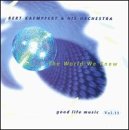 Wonderland By Night was released and rocketed straight to the top of the charts! It occupied the Number One position all over the world – and in Germany too it was a triumphant success! Bert Kaempfert was awarded his very first golden record.
Wonderland By Night was released and rocketed straight to the top of the charts! It occupied the Number One position all over the world – and in Germany too it was a triumphant success! Bert Kaempfert was awarded his very first golden record.
The readers of the American music magazine "Cash Box" voted the Bert Kaempfert Orchestra the best of the world in the category "Band of the Future". The breakthrough to true international success was there.
The Songs the Whole World Sings
Bert Kaempfert's melodies won the hearts of millions. His incomparable sound, dominant bass, swinging rhythm and velvet-smooth blend of chorus and strings ensured that his music was a success the world over. In 1965 he was commissioned by the American company Universal Pictures to compose the soundtrack for the film "A Man Could Get Killed"
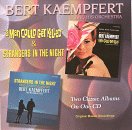 The theme song of the film "A Man Could Get Killed" became Strangers In The Night and brought about Frank Sinatra’s great comeback. In 1966 Kaempfert was awarded the Golden Globe for this melody.
The theme song of the film "A Man Could Get Killed" became Strangers In The Night and brought about Frank Sinatra’s great comeback. In 1966 Kaempfert was awarded the Golden Globe for this melody.
Al Martino entered the Top Ten with Bert Kaempfert's Spanish Eyes (originally Moon Over Naples) and his sensational career took off like a rocket. It has been estimated that about 500 versions of Spanish Eyes exist.
Danke Schoen
Danke Schoen brought fame to Wayne Newton. Within just a few months the song could be heard in over 70 versions and even today it still provides the theme music for the finales of big shows.
Other winning combinations of artist and Bert Kaempfert composition followed: Nat "King" Cole with L.O.V.E., Jack Jones with Lady, Sammy Davis jr. with Lonely Is The Name, and Dean Martin with I Can't Help Remembering You.
In Demand
Kaempfert melodies were in great demand – they guaranteed success: Johnny Mathis, Pete Fountain, Anita Kerr and Bobby Hackett all recorded LPs devoted to compositions by Bert Kaempfert. 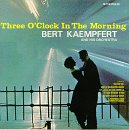
In 1968 Bert Kaempfert won no less than five BMI Awards for his compositions Lady, Spanish Eyes, Sweet Maria, Strangers In The Night and finally The World We Knew – the second hit for Frank Sinatra.
All over the world people listened to his Afrikaan Beat, A Swingin' Safari and That Happy Feeling. In Argentina he won an award for his LP entitled LIVING IT UP and later another for Footprints In The Sand.
Music for Everyone
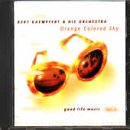 Bert Kaempfert was just like his music, a man of quiet tones. In spite of his international success he remained true to his character, saying:
Bert Kaempfert was just like his music, a man of quiet tones. In spite of his international success he remained true to his character, saying:
"I want to make music for everyone. It must be enjoyed by all, otherwise it is pointless."
In the meantime, golden records were showered upon him. Among other prizes, he was honoured with Germany's "Goldene Stimmgabel" (Golden Tuning-Fork), "Goldene Notenschlüssel" (Golden Clef) and two "Goldene Europa" (Golden Europe) awards.
When "disco sound" became popular, Bert Kaempfert recorded the Theme From Shaft, an Isaac Hayes song. As soon as Hayes heard Bert Kaempfert's version, he called him on the telephone to say: "Bert, it's fantastic! I like your recording better than my own!"
Final Tour
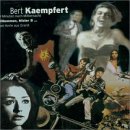 In 1980 Bert Kaempfert went on a three-week tour of England. His wife Hanne, who died in 1988, recalled: "The English were an absolutely fantastic audience. They only needed to hear a couple of bars of music before they started to applaud.
In 1980 Bert Kaempfert went on a three-week tour of England. His wife Hanne, who died in 1988, recalled: "The English were an absolutely fantastic audience. They only needed to hear a couple of bars of music before they started to applaud.
Most impressive of all was the final concert in London's Royal Albert Hall where more than 5,000 people prevented Fips and his orchestra from leaving the concert platform. There were standing ovations and four encores! Three were usual, the fourth was kept in reserve "just in case" – and had only been given a single rehearsal. But it came off! My husband was tremendously happy."
He took his leave of the audience with the words:
"I'd be happy to continue, but I haven't got any more music scores and my musicians are thirsty!'"
Two days later we flew from London to Palma de Majorca to stay in our holiday home. Fips wanted to relax after the stress and strain of the tour. Even while in the air he was busy making new plans. And he had plenty of offers. Now everyone wanted Bert Kaempfert live!"
The Day the Music Died
On 21 June 1980, however, Bert Kaempfert suddenly died in his Majorcan home as the result of a stroke. It was a severe shock – not only for his family and friends. The whole world of music mourned his loss and everybody was deeply shaken by his premature death. He was only 56 years old.
Bert Kaempfert's wish was to be buried in the Everglades, as was the custom among his friends, the fishing-boat captains. "We strewed his ashes in the sea where the Everglades begin" recounted Hanne who had been married to him for 34 years.
Posthumous Honors
Bert Kaempfert was honoured posthumously with Germany's "Goldene Stimmgabel" (Golden Tuning-Fork) in 1984.
In 1993 he was awarded BMI's "Lifetime Achievement Award" and was also elected to the "Songwriters' Hall of Fame" in New York: Bert Kaempfert was the very first German to receive what is surely the most prestigious international award for a composer.
His immortal melodies live on and continue to give pleasure to millions of people – just as he had always wished.

